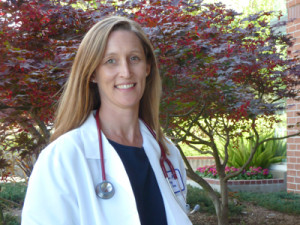Kaiser Permanente helps people stay healthy with programs designed to prevent bone fractures.
Do you know someone with osteoporosis? Chances are the answer is yes, or it soon will be.
In the United States, nine million people already have the disease, and another 43 million are at high risk because of low bone density. One in two women and one in four men over the age of 50 will break a bone in their lifetime because of the disease.
In recognition of National Osteoporosis Month, we spoke with endocrinologist Kendal Hamann, MD, the Kaiser Permanente Northern California clinical lead for fracture prevention.

Why is it important to screen for osteoporosis?
We want to catch people before they break a bone, or in cases where someone has already had a fracture, we want to reduce their risk of having another one.
Bone fractures can be devastating in older people — one of the most devastating is a hip fracture. The mortality associated with hip fractures is up to 30 percent within the year of fracture for people over 65. These are life-changing events for people. Many people never regain the level of independence and function they had before.
We have tools to minimize the risk of fractures. The medications we use can reduce risk by as much as 50 percent. Other interventions include regular exercise, appropriate vitamin D, and calcium intake, taking steps to minimize the risk of falls, and quitting smoking.
What should men know about osteoporosis?
It’s outdated to think of osteoporosis as a woman’s disease. Men are also at risk, but the onset of osteoporosis for men is typically delayed 5 to 10 years when compared to women. Women start to lose bone density at a rapid pace after menopause. Men lose it at a more gradual pace as they get older.
Tell us about Kaiser Permanente’s approach to screening.
We have programs to reach out and order screening bone density scans for women 65 and older and women over 50 who have significant risk factors for osteoporosis. We hope to soon include men who are at risk in this outreach. We also contact men and women over 50 who have had a high-risk fracture to encourage them to have basic osteoporosis chemistry lab work, a bone density scan, and treatment if needed.
The bone density scan is a painless screening test for osteoporosis that uses a minimal amount of radiation to measure bone density at the lower spine and hip. People with low bone density are at higher risk for having either a spontaneous fracture or a fracture with little traumatic impact.
Any of our providers can see a flag in our system when a patient is in need of a screening exam and can then order the test on the spot.
How can we prevent osteoporosis?
Preventing osteoporosis starts at a very young age with a healthy diet and regular exercise. It’s also important to stay away from smoking or drinking too much alcohol.
Weight-bearing exercise — such as walking — is ideal for osteoporosis prevention. When you stand up and bear your own weight, you stimulate bone cells to make more bone.
It’s also a good idea to do muscle-strengthening exercises, such as Tai Chi. This and other types of exercise will strengthen your core, which helps reduce the risk of falls and fractures. Our ultimate goal is that no one suffer a broken bone that could have been prevented.





This Post Has 2 Comments
Thanks for helping me understand that losing bone density usually starts after the menopausal stage, and it happens fast. With that in mind, I will seek a doctor to get checked and treated immediately if I am at risk. This is because I am almost at that stage since I am in my late 40s this year.
You make a good point how early screening is important since you want to minimize the risk of fractures due to osteoporosis. My wife has a family history of osteoporosis, so this is definitely something to keep in mind for her. I’ll make sure she gets screened early on so that we can take appropriate preventative measures to keep her bones healthy.